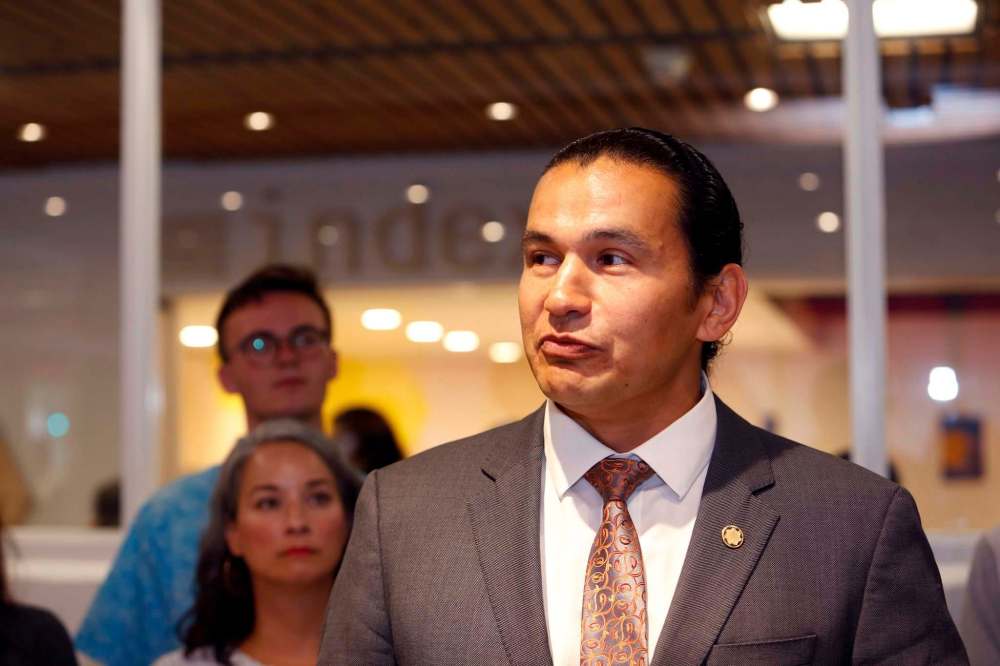On questions of Kinew’s character, silence is deafening
Advertisement
Read this article for free:
or
Already have an account? Log in here »
To continue reading, please subscribe:
Monthly Digital Subscription
$19 $0 for the first 4 weeks*
- Enjoy unlimited reading on winnipegfreepress.com
- Read the E-Edition, our digital replica newspaper
- Access News Break, our award-winning app
- Play interactive puzzles
*No charge for four weeks then billed as $19 plus GST every four weeks. Offer only available to new and qualified returning subscribers. Cancel any time.
Read unlimited articles for free today:
or
Already have an account? Log in here »
Hey there, time traveller!
This article was published 13/09/2017 (2661 days ago), so information in it may no longer be current.
It is hard to reconcile the number of women who have said they stand in solidarity with victims of violence who are now standing behind an individual who has been caught numerous times acting in a misogynistic manner.
How can the feminist community support the NDP leadership bid of Wab Kinew at the same time that they have spoken out against the likes of former CBC broadcaster Jian Ghomeshi or rapper Eminem?
Is it reconciliation? Is it race? Is it ideology?

Let’s start with reconciliation: Kinew says he’s been open about the fact he was a screw-up in his youth — something he addressed in his book The Reason You Walk. He says he’s taken his life from being negative to being positive.
In an interview with The Canadian Press, after details were released about a previously undisclosed domestic violence case, as well as an assault and theft that occurred in his 20s (whether that qualifies as “youth,” I’m not sure), Kinew said he’s been “reaching out to some supporters and they’ve been very encouraging and… the message of a second chance is what I’ve heard them express as being important to them.”
Fair enough. If he’s contrite and apologetic, give him a second chance.
Except — and it’s big one, folks — he hasn’t exactly been contrite about his misogyny. In the same CP interview, he downplayed and misrepresented the domestic violence incident.
First, he told the reporter it was dismissed.
Then, he told the reporter it was investigated. He told the reporter it was dropped. He told the reporter there was nothing to it.
Not so fast, Wab. It wasn’t dropped; it was stayed. And more importantly, contrition demands full disclosure.
Why not include that information in an autobiographical book — a book about redemption and turning a life around?
Feminists know domestic violence is much like sexual violence — 70 per cent of domestic violence goes unreported; half of all women will experience at least one incident of domestic violence in their life after the age of 16; Indigenous women are six times more likely than non-Indigenous women to die because of domestic violence.
Victims seldom see justice in the courts of law. Feminists have stood universally behind victims in Twitter campaigns.
And in the feminist community within the NDP right now? Crickets.
It’s hard to understand, particularly after Kinew has been already taken to task for openly misogynistic tweets as recently as 2011. This is definitely not “in his youth”; instead, it was when he was 27 years old and around the same time he began working in a professional capacity for the University of Winnipeg — a university that prides itself on diversity and inclusion.
When confronted with these tweets during the provincial election in 2016, the NDP initially questioned their authenticity and Kinew refused to comment. And after eventually being forced to come clean, he once again downplayed the issue, saying he is an open book.
But he’s not. There seems to be more information that he’s just not talking about and only when he’s pushed into a corner does he come clean.
On the issue of race, Kinew has worked hard to reach out to Indigenous youth in Winnipeg to act as a role model — and that’s positive. Certainly, his privileged background — which includes attending a private school and upper-middle-class parents — may set him apart from those he’s trying to reach, but he has spoken about his father’s issues with the residential school system and that may help him relate.
One of my close friends who works within the Indigenous community says that at times, First Nations people are reluctant to speak out against their own. It feels disloyal. I can sympathize with that.
But First Nations women are demanding answers right now on issues of violence against murdered and missing Indigenous women. Not addressing misogyny from within their own community isn’t going to bring closure. It’s just going to bury the problem deeper. And if it’s ideology, then the NDP has a far greater problem on its hands. I asked a couple of my friends who are ardent NDP supporters and feminists how they can back Kinew and their response is straightforward — he’s better than the alternative.
That’s a frightening statement about what used to be the most powerful party in the province, and it suggests that despite the March 2015 leadership win for Greg Selinger that was supposed to put the party’s “troubles” behind them, it’s still broken.
Pile on top of that the loss of some first-rate talent that decided not to run again and those who got shown the door at election time, and you’ve got a party that has pretty much conceded to Premier Brian Pallister a second term.
You can almost hear the squeals of delight coming from under the dome.
Shannon Sampert is the director of EvidenceNetwork.ca and an associate professor in the department of political science at the University of Winnipeg.


